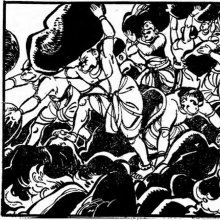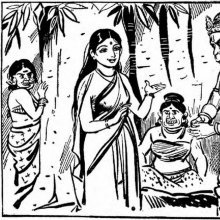Worry, Worried, Worrying: 3 definitions
Introduction:
Worry means something in Hinduism, Sanskrit. If you want to know the exact meaning, history, etymology or English translation of this term then check out the descriptions on this page. Add your comment or reference to a book if you want to contribute to this summary article.
Images (photo gallery)
In Hinduism
Natyashastra (theatrics and dramaturgy)
Source: Shodhganga: Elements of Art and Architecture in the Trtiyakhanda of the Visnudharmottarapurana (natya)Showing Worry (expression) is associated with Mandālasa: one of the nine kinds of śayyāsthāna or “lying down postures” (in Indian Dramas), as conveyed through Āṅgikābhinaya: one of the four divisions of Abhinaya or “ways to convey or represent one’s emotion to others”, according to the Nāṭyaśāstra and the Viṣṇudharmottarapurāṇa, an ancient Sanskrit text which (being encyclopedic in nature) deals with a variety of cultural topics such as arts, architecture, music, grammar and astronomy.— The word mandālasa is the amalgamation of two words viz., manda i.e., slow and ālasa i.e., lazyness. To show worry, sadness and separation as well as excitement, the actor should stretch one leg and sit on other and this position is called mandālasa posture.

Natyashastra (नाट्यशास्त्र, nāṭyaśāstra) refers to both the ancient Indian tradition (shastra) of performing arts, (natya—theatrics, drama, dance, music), as well as the name of a Sanskrit work dealing with these subjects. It also teaches the rules for composing Dramatic plays (nataka), construction and performance of Theater, and Poetic works (kavya).
Yoga (school of philosophy)
Source: ORA: Amanaska (king of all yogas): A Critical Edition and Annotated Translation by Jason Birch(The mental state of) Worry is denoted by the Sanskrit term Cintā, according to the Amanaska Yoga treatise dealing with meditation, absorption, yogic powers and liberation.—Accordingly, as Īśvara says to Vāmadeva: “[...] Now, I will teach knowledge for the liberation of those people who have conquered their passion. [...] The highest reality is defined as that which is free from the elements such as ether; beyond the organs of perception and free of [mental] states such as worry (cintā). [...]”.

Yoga is originally considered a branch of Hindu philosophy (astika), but both ancient and modern Yoga combine the physical, mental and spiritual. Yoga teaches various physical techniques also known as āsanas (postures), used for various purposes (eg., meditation, contemplation, relaxation).
Ayurveda (science of life)
Source: International Research Journal of Ayurveda and Yoga: Role of Ayurveda in the Management of Manas Roga (Mental Disorders)Worry is denoted by the Sanskrit term Cintā (Chinta) and refers to one of the negative conditions of modern society.—Mental Health (according to Ayurveda) is brought about essentially as a result of unwholesome interaction between the individual and this environment. Epidemiological studies report prevalence rates for psychiatric disorders varying from 9.5 to 370/1000 population in India. [...]. In today’s metaphysical society, human life has become speedy, mechanized, and less effective and more centred, which contribute to more production of [e.g., Chinta (worry)].

Āyurveda (आयुर्वेद, ayurveda) is a branch of Indian science dealing with medicine, herbalism, taxology, anatomy, surgery, alchemy and related topics. Traditional practice of Āyurveda in ancient India dates back to at least the first millenium BC. Literature is commonly written in Sanskrit using various poetic metres.
See also (Relevant definitions)
Full-text (+586): Toshisa, Cintakranta, Ucchada, Cimta, Ganjanuka, Cintabhara, Lavatoda, Cimtamagna, Chinta, Cimtakramte, Cimtamagne, Hetheti, Duguda, Ataghata, Ubajala, Cimtamagnate, Atagholana, Sochneey, Hambalike, Dushcitta.
Relevant text
Search found 264 books and stories containing Worry, Worried, Worrying; (plurals include: Worries, Worrieds, Worryings). You can also click to the full overview containing English textual excerpts. Below are direct links for the most relevant articles:
The Padma Purana (by N.A. Deshpande)
Chapter 11 - The Story of Suvrata < [Section 2 - Bhūmi-khaṇḍa (section on the earth)]
Chapter 87 - Subtle Are the Ways of Dharma < [Section 5 - Pātāla-Khaṇḍa (Section on the Nether World)]
Chapter 196 - Dhundhulī’s Story < [Section 6 - Uttara-Khaṇḍa (Concluding Section)]
Jainism and Patanjali Yoga (Comparative Study) (by Deepak bagadia)
Artadhyana (Meditation on Pain, sorrow) < [Chapter 3 - Jain Philosophy and Practice]
Part 4.4 - Yogic techniques for control of Vrttis (1): Kriyayoga < [Chapter 2 - Yoga philosophy and practices]
Part 8.3 - Introduction to Samkhya Philosophy < [Chapter 1 - Introduction]
Letters about Vipassana (by Nina van Gorkom)
Things as They Are (by Acariya Maha Boowa Nanasampanno)
Chapter 2 - The Tracks Of The Ox
Chapter 12 - To Be An Inner Millionaire
Bhakti-rasamrta-sindhu (by Śrīla Rūpa Gosvāmī)
Verse 2.4.7 < [Part 4 - Transient Ecstatic Disturbances (vyābhicāri-bhāva)]
Verse 2.2.20 < [Part 2 - Ecstatic Expressions (anubhāva)]
Verse 2.1.230 < [Part 1 - Ecstatic Excitants (vibhāva)]
Mahayana Mahaparinirvana Sutra
Chapter XXIV - On Pure Actions (d) < [Section Four]
Chapter III - On Grief < [Section One]
Chapter XXIX - On Bodhisattva Highly-Virtuous King (c) < [Section Six]
Related products







